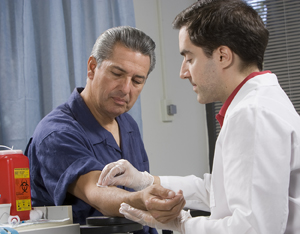Kidney Stones: Your Evaluation
A medical evaluation helps your healthcare provider find out what’s causing your symptoms. A health history and physical exam may reveal signs of a stone and perhaps why it formed. Diagnostic studies can confirm the presence of a stone and locate it. Detailed metabolic tests of your blood, urine, and the stone may also be done. These test results help your healthcare provider recommend treatment.

Diagnostic tests
These tests confirm your healthcare provider’s diagnosis. They can detect infection or reveal the image of a stone. You may not need all of these tests.
-
Urinalysis. This looks for blood in the urine (hematuria), one sign of a stone. Pus in the urine (pyuria) suggests a stone or infection. The pH of the urine is also tested, which shows if your urine is acidic or alkaline. Alkaline urine makes it more likely that struvite (infection) stones will form.
-
Urine culture. This can show a urinary tract infection. Test results appear 24 hours to 48 hours after the urine sample is collected.
-
Blood tests. These can confirm a kidney infection. They show any problems in your white blood cell count.
-
KUB (kidney, ureter, bladder) X-ray. This imaging test provides a view of your kidneys, ureters, and bladder. Some stones are dense enough to show up on X-rays, and some stones can't be seen. An IVP (intravenous pyelogram) X-ray uses dye to locate your stone. It also shows whether there is a blockage in that kidney. This test may not be used if you have kidney failure.
-
Ultrasound. This imaging test uses sound waves to create a picture of the kidney. This helps show stones and reveal blockages in the urinary tract.
-
CT scan. This takes multiple X-rays of the urinary tract. This helps locate and identify a stone. A CT scan can be done without dye. This makes it safe for people who have dye allergies or kidney disease. The CT scan with dye is now the gold standard test to diagnose kidney stones.
Metabolic tests
If you have a stone, your healthcare provider may order metabolic tests. These tests may show why you formed a stone. And they show what kind of stone you may form in the future. This helps your healthcare provider plan your treatment and prevention program.
-
Stone analysis. This test shows what your stone is made of, if the stone is retrieved. This may suggest the cause of your stone.
-
Blood tests. These measure your levels of stone-related chemicals, such as calcium. They may also find possible causes, such as gout or hyperparathyroidism.
-
24-hour urine sample. This shows the levels of stone-related chemicals in your urine. You collect all your urine for 24 hours in a special container.
-
Provocative tests. These show how well your kidneys handle chemicals, such as calcium. The tests check your response to low-calcium or high-calcium diets.
© 2000-2024 The StayWell Company, LLC. All rights reserved. This information is not intended as a substitute for professional medical care. Always follow your healthcare professional's instructions.